【冲刺2014】英语专题辅导与训练课件:1[1]25 情景交际(通用版)(共48张PPT)
文档属性
| 名称 | 【冲刺2014】英语专题辅导与训练课件:1[1]25 情景交际(通用版)(共48张PPT) |
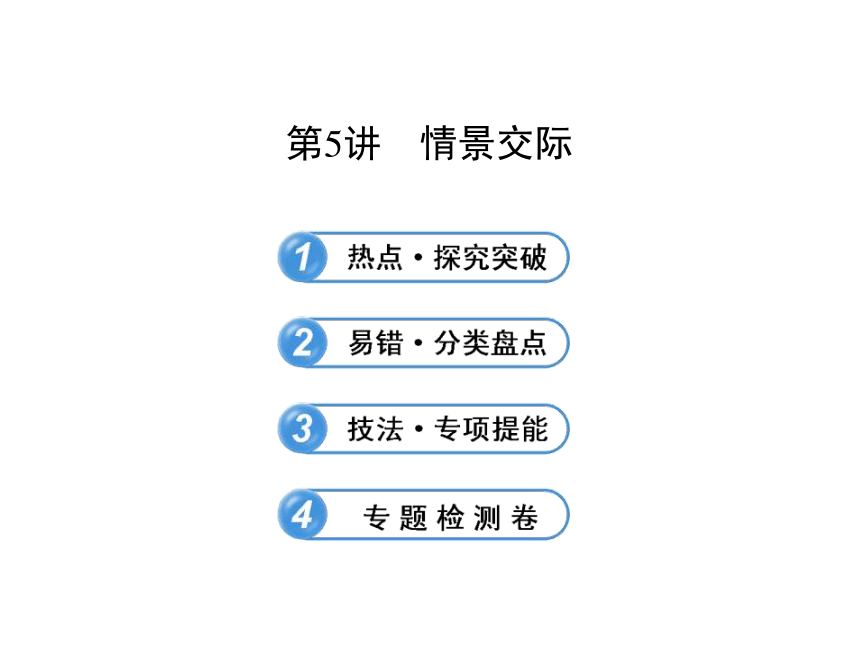
|
|
| 格式 | zip | ||
| 文件大小 | 705.0KB | ||
| 资源类型 | 教案 | ||
| 版本资源 | |||
| 科目 | 英语 | ||
| 更新时间 | 2014-02-16 00:00:00 | ||
图片预览

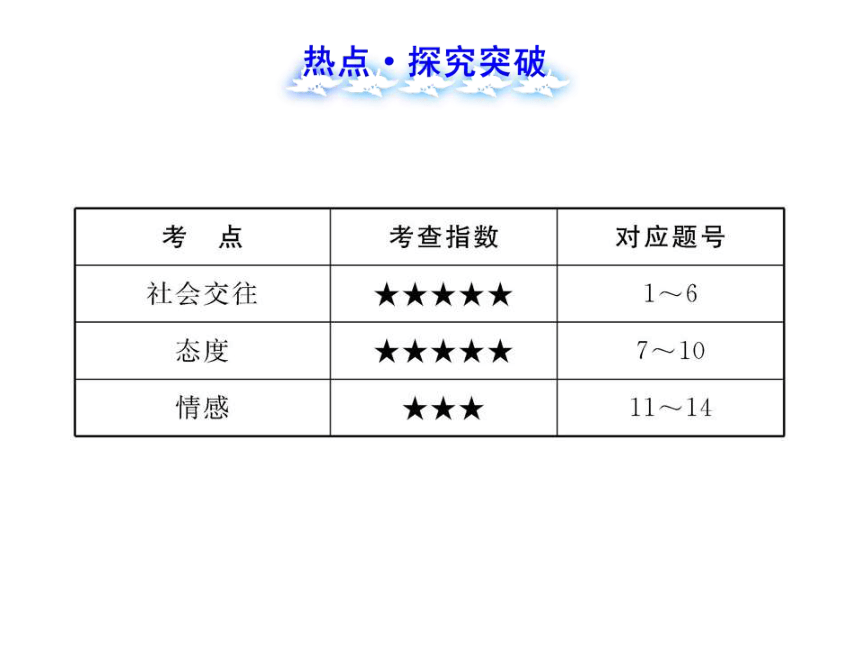
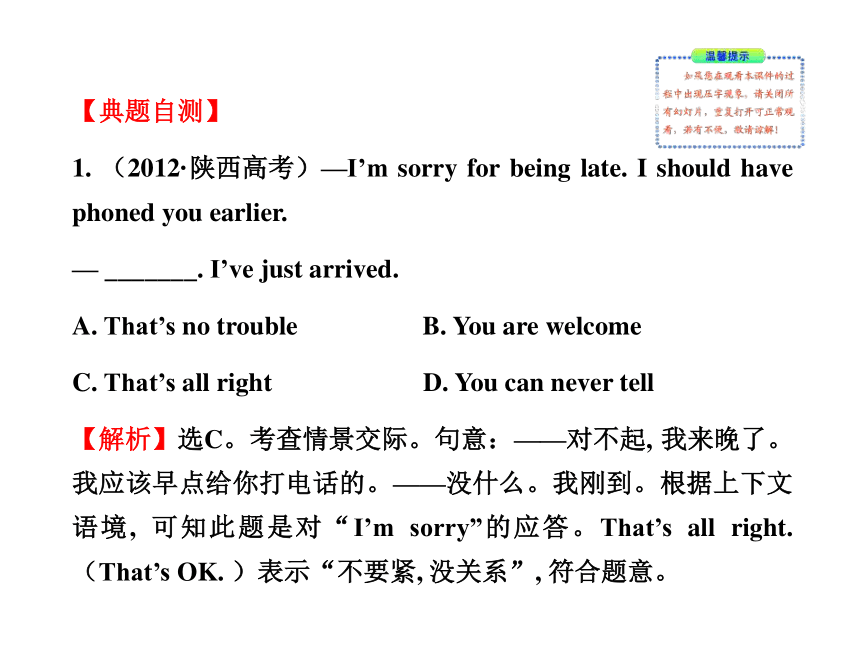
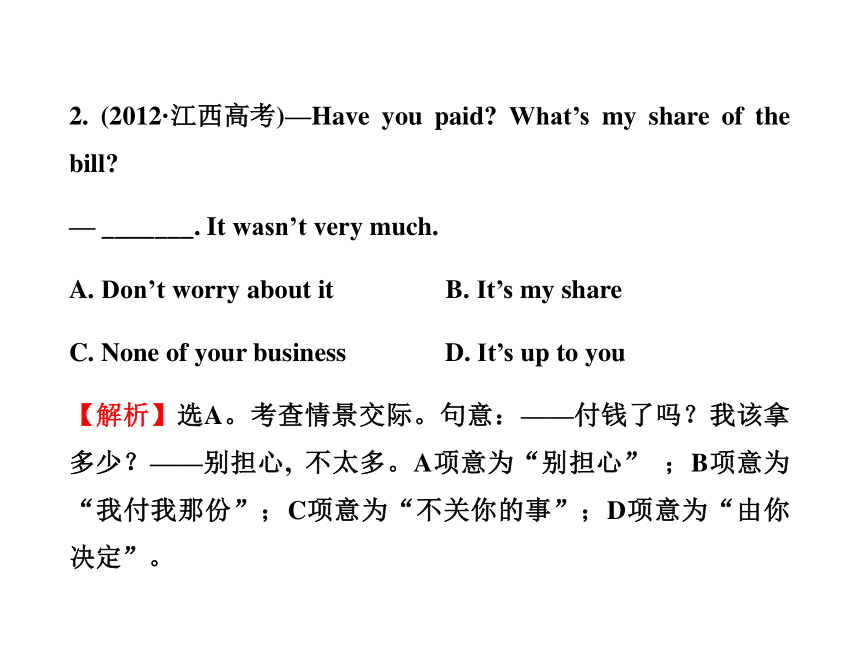
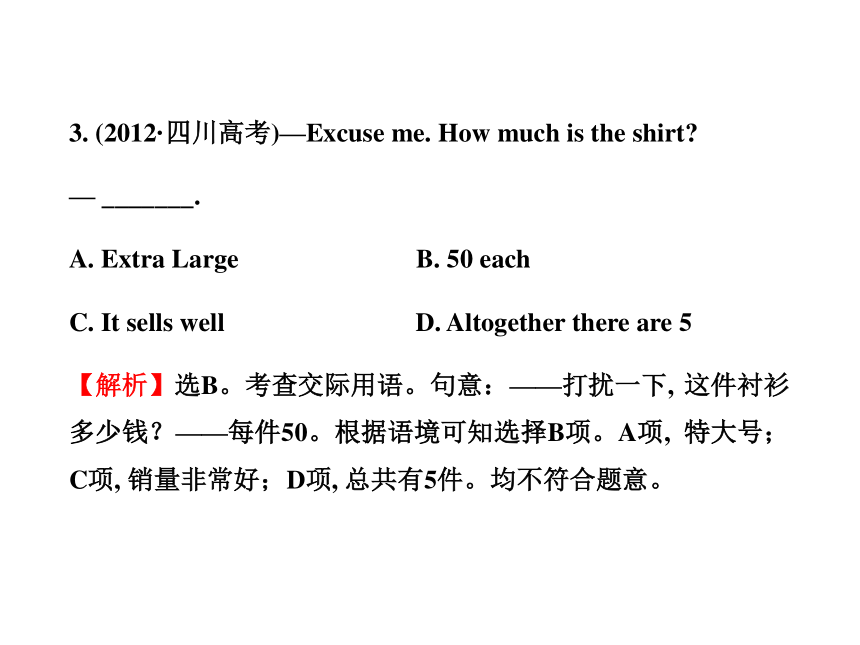
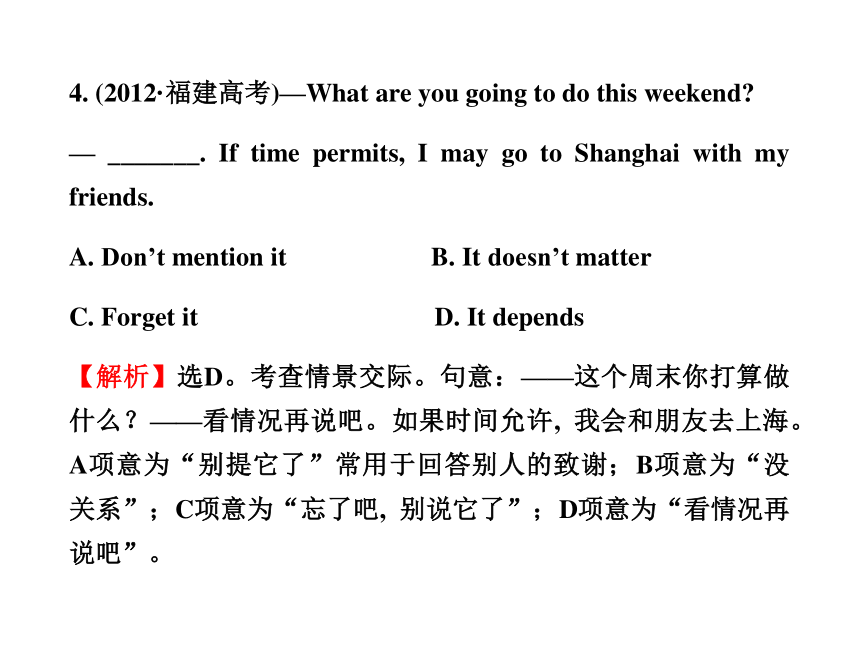
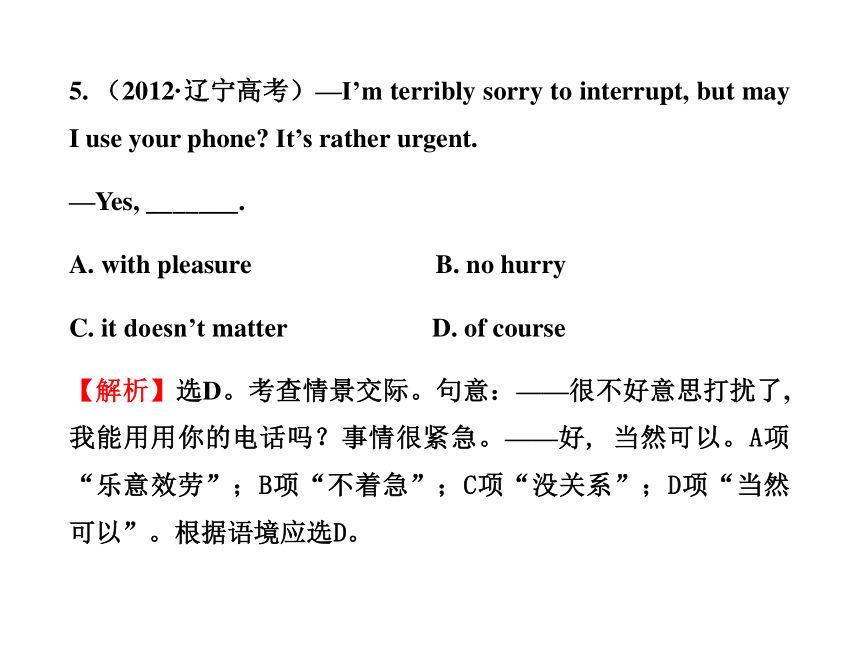
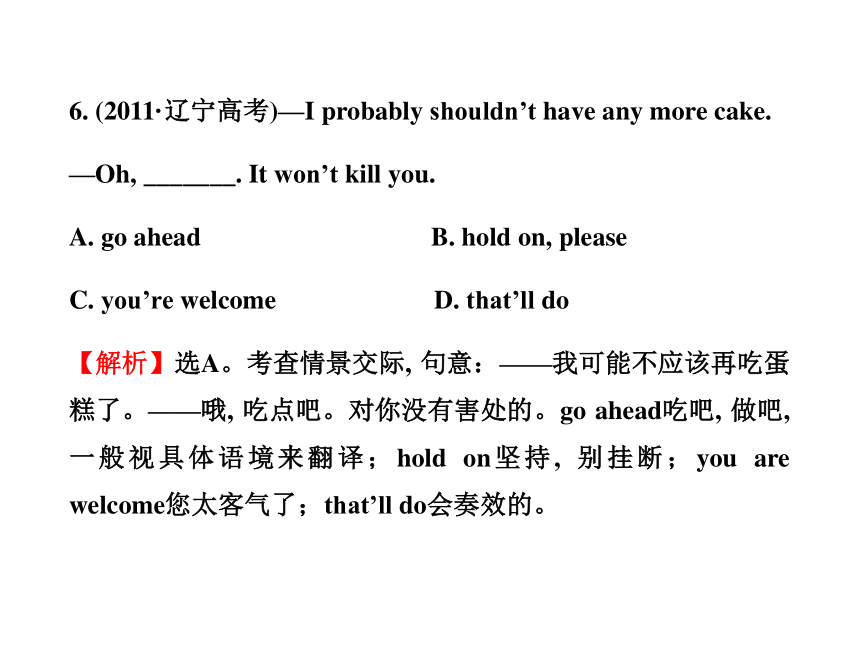
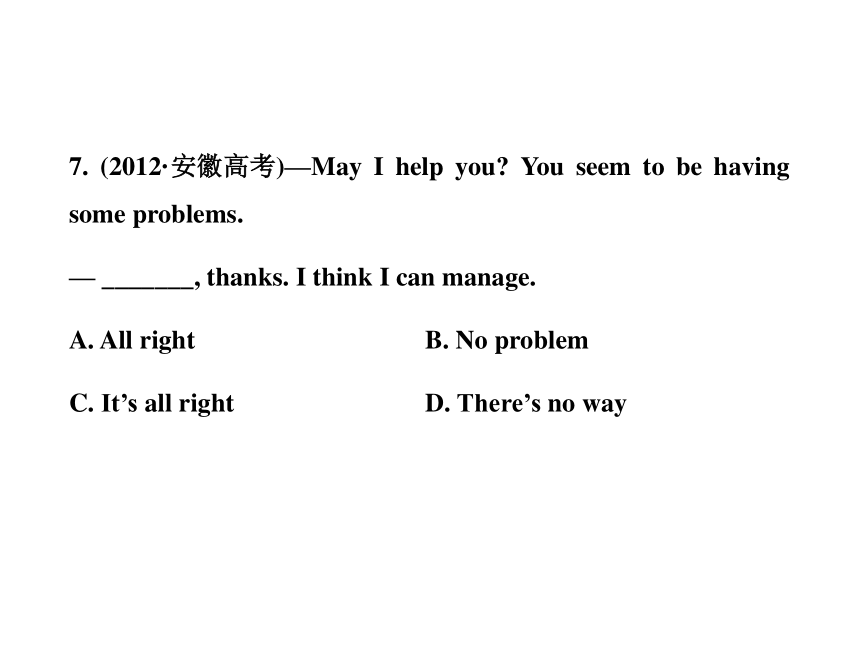
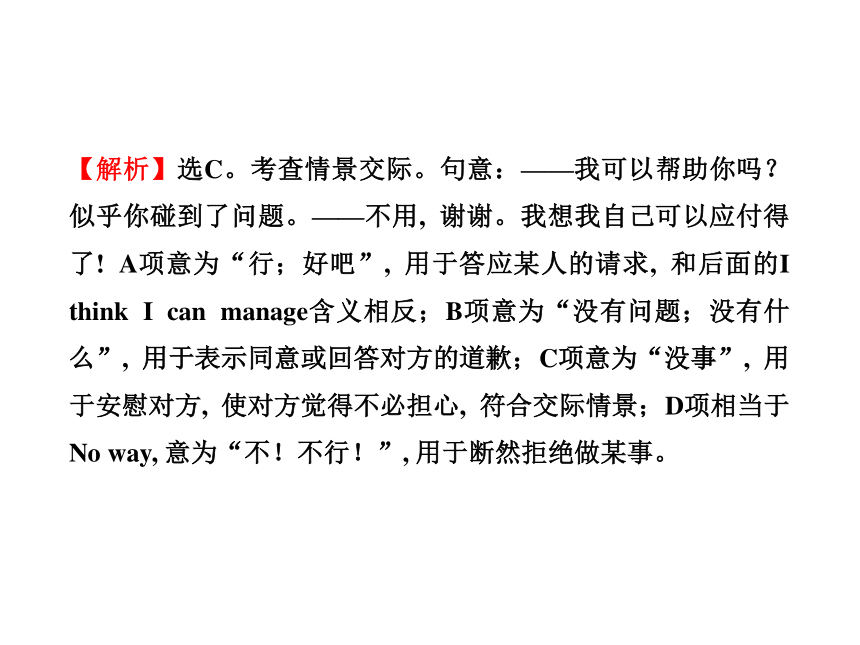
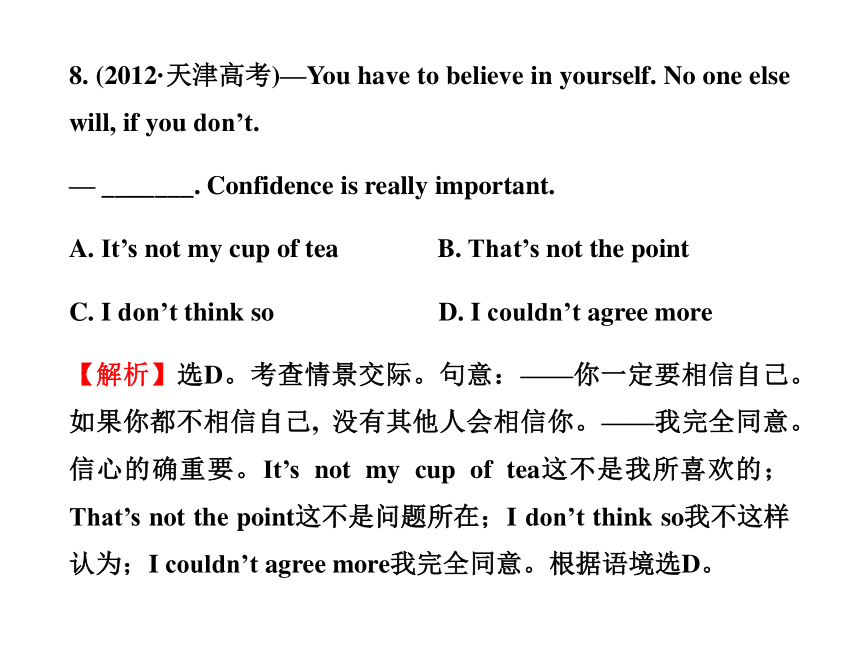
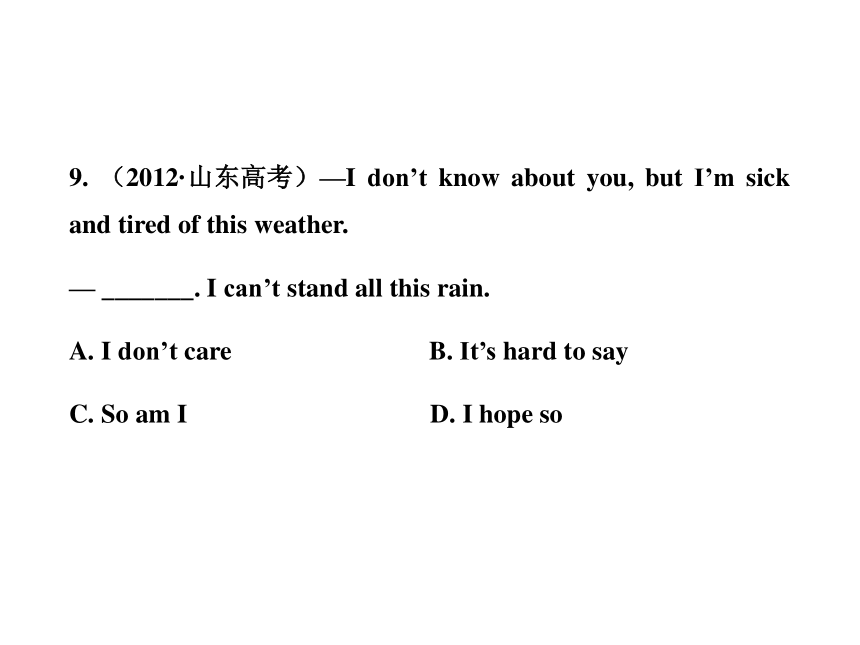
文档简介
课件48张PPT。第5讲 情景交际【典题自测】
1. (2012·陕西高考)—I’m sorry for being late. I should have phoned you earlier.
— _______. I’ve just arrived.
A. That’s no trouble B. You are welcome
C. That’s all right D. You can never tell
【解析】选C。考查情景交际。句意:——对不起, 我来晚了。我应该早点给你打电话的。——没什么。我刚到。根据上下文语境, 可知此题是对“I’m sorry”的应答。That’s all right. (That’s OK. )表示“不要紧, 没关系”, 符合题意。2. (2012·江西高考)—Have you paid? What’s my share of the bill?
— _______. It wasn’t very much.
A. Don’t worry about it B. It’s my share
C. None of your business D. It’s up to you
【解析】选A。考查情景交际。句意:——付钱了吗?我该拿多少?——别担心, 不太多。A项意为“别担心” ;B项意为“我付我那份”;C项意为“不关你的事”;D项意为“由你决定”。3. (2012·四川高考)—Excuse me. How much is the shirt?
— _______.
A. Extra Large B. 50 each
C. It sells well D. Altogether there are 5
【解析】选B。考查交际用语。句意:——打扰一下, 这件衬衫多少钱?——每件50。根据语境可知选择B项。A项, 特大号;C项, 销量非常好;D项, 总共有5件。均不符合题意。4. (2012·福建高考)—What are you going to do this weekend?
— _______. If time permits, I may go to Shanghai with my friends.
A. Don’t mention it B. It doesn’t matter
C. Forget it D. It depends
【解析】选D。考查情景交际。句意:——这个周末你打算做什么?——看情况再说吧。如果时间允许, 我会和朋友去上海。A项意为“别提它了”常用于回答别人的致谢;B项意为“没关系”;C项意为“忘了吧, 别说它了”;D项意为“看情况再说吧”。5. (2012·辽宁高考)—I’m terribly sorry to interrupt, but may I use your phone? It’s rather urgent.
—Yes, _______.
A. with pleasure B. no hurry
C. it doesn’t matter D. of course
【解析】选D。考查情景交际。句意:——很不好意思打扰了, 我能用用你的电话吗?事情很紧急。——好, 当然可以。A项“乐意效劳”;B项“不着急”;C项“没关系”;D项“当然可以”。根据语境应选D。6. (2011·辽宁高考)—I probably shouldn’t have any more cake.
—Oh, _______. It won’t kill you.
A. go ahead B. hold on, please
C. you’re welcome D. that’ll do
【解析】选A。考查情景交际, 句意:——我可能不应该再吃蛋糕了。——哦, 吃点吧。对你没有害处的。go ahead吃吧, 做吧, 一般视具体语境来翻译;hold on坚持, 别挂断;you are welcome您太客气了;that’ll do会奏效的。7. (2012·安徽高考)—May I help you? You seem to be having some problems.
— _______, thanks. I think I can manage.
A. All right B. No problem
C. It’s all right D. There’s no way【解析】选C。考查情景交际。句意:——我可以帮助你吗?似乎你碰到了问题。——不用, 谢谢。我想我自己可以应付得了! A项意为“行;好吧”, 用于答应某人的请求, 和后面的I think I can manage含义相反;B项意为“没有问题;没有什么”, 用于表示同意或回答对方的道歉;C项意为“没事”, 用于安慰对方, 使对方觉得不必担心, 符合交际情景;D项相当于No way, 意为“不!不行!”, 用于断然拒绝做某事。8. (2012·天津高考)—You have to believe in yourself. No one else will, if you don’t.
— _______. Confidence is really important.
A. It’s not my cup of tea B. That’s not the point
C. I don’t think so D. I couldn’t agree more
【解析】选D。考查情景交际。句意:——你一定要相信自己。如果你都不相信自己, 没有其他人会相信你。——我完全同意。信心的确重要。It’s not my cup of tea这不是我所喜欢的;That’s not the point这不是问题所在;I don’t think so我不这样认为;I couldn’t agree more我完全同意。根据语境选D。9. (2012·山东高考)—I don’t know about you, but I’m sick and tired of this weather.
— _______. I can’t stand all this rain.
A. I don’t care B. It’s hard to say
C. So am I D. I hope so【解析】选C。考查情景交际。句意:——我不知道你感觉怎么样, 我可是受不了这种天气。——我也是。我受不了这种雨天。A项意为“我不在乎”, 与语境不符;B项意为“很难说”, 也不符合语境;C项意为“我也是”, So am I是一个省略形式的倒装句, 是对I’m sick and tired of this weather的回答;D项意为“我希望这样”, 不符合语境。根据以上分析可知选C。10. (2012·全国卷Ⅰ)—Which one of these do you want?
— _______. Either will do.
A. I don’t mind B. I’m sure
C. No problem D. Go ahead
【解析】选A。考查情景交际。句意:——在这些中你想要哪一个?——我不介意。任意一个都行。I don’t mind我不介意;I’m sure我肯定;No problem没问题;Go ahead请说/做吧。根据Either will do. 可知, 说话者不介意。故选A。11. (2012·重庆高考)—The Modern Art Exhibition in the City Museum has been cancelled.
—Oh, no! _______.
A. It’s a pity B. It doesn’t matter
C. I knew it already D. It’s not interesting at all
【解析】选A。考查情景交际。句意:——城市博物馆的现代艺术展已经被取消了。——哦, 不!太可惜了。由Oh, no! 可知, 说话者觉得取消艺术展是件可惜的事。It’s a pity. 太可惜了;It doesn’t matter. 没关系;I knew it already. 我已经知道了;It’s not interesting at all. 没什么有趣的。12. (2012·江苏高考)—Don’t worry, Mum. The doctor said it was only the flu.
— _______! I’ll tell Dad there’s nothing serious.
A. What a relief B. Congratulations
C. How surprising D. I’m so sorry
【解析】选A。考查情景交际。句意:——别担心, 妈妈。医生说这只是流感。——这下放心了!我要告诉爸爸没有什么要紧的。A项表示“这下放心了”;B项表示“恭喜, 祝贺”;C项表示“太惊讶了”;D项表示“我很抱歉或我很难过”。13. (2012·浙江高考)—I’m going to San Francisco for a couple of days.
— _______. I wish I could get away for a while.
A. It doesn’t matter B. Forget it
C. I really envy you D. I can’t agree more
【解析】选C。考查情景交际。句意:——我要去旧金山待几天。——我真羡慕你。我希望我也能休假一段时间。It doesn’t matter没关系;Forget it 算了;I really envy you我真羡慕你;I can’t agree more我完全同意。14. (2011·福建高考)—My teacher says she’s canceling the class play. I just can’t understand.
— _______. You were looking forward to it.
A. It doesn’t matter
B. It’s very unwise of her
C. Don’t worry about it
D. You must be disappointed【解析】选D。考查情景交际。句意:——老师说她要取消课堂游戏。我真不明白。——你一定失望了, 你一直期待着呢。It doesn’t matter没关系;It’s very unwise of her她很不明智;Don’t worry about it不要担心;You must be disappointed你一定失望了。【考点归纳】
一、社会交往
1. 感谢及应答:
Thank you for. . . /It’s very kind of you. /You’re welcome. /Don’t mention it. /Think nothing of it. /It’s my pleasure. /My pleasure. /Forget it. /Not at all. / That’s all right. / That’s OK. /No problem. / Thanks anyway. /Thank you all the same. /I’m glad you’ve enjoyed it. 2. 道歉及应答:
I’m sorry. /I apologize for. . . /Forgive sb. for. . . /That’s all right. /Never mind. /Not to worry. /It doesn’t matter. /That’s nothing. /Not at all. /That’s OK. /Forget it.
3. 请求允许和应答:
Can I. . . ? /I wonder if you can. . . . /Is it all right if I. . . ? /Is it OK if I. . . ? /Can I get you to. . . ? /Would you like me to. . . ? /Could you be so kind as to. . . ? /Do you mind if I. . . ? /May I. . . ? /Would you please help me with. . . ? /Could you. . . ? /I’m afraid not. /Sure. What is it? /That would be great! /Yes, I do. /Go ahead. /With pleasure. /I’d like to. /Not at all. 4. 提供帮助和应答:
We could give you. . . / Can I help you? /Can I give you a hand? /Do you want. . . ? /Oh, that would be great. Thank you. /No, thank you(thanks). /I wouldn’t say no.
5. 邀请和应答:
Will you come to. . . ? /Would you like to join. . . ? /Will you come with me to. . . ? /Will you join us in. . . ? /I wonder if we could go shopping. /I’d like to. /Thanks, but I. . . /I’m afraid not. /That would be very nice. /Sounds good/great. /Why not? 二、态度
1. 同意和不同意:
Why not? /I quite agree. /I couldn’t agree more. /I don’t think so. /I’m with you on that. /No problem. /Certainly. /Sure. /Of course. /By all means.
2. 肯定和不肯定:
That’s for sure. /By no means. /No doubt. /Perhaps. /Maybe. 三、情感
You must be disappointed. /What a pity! /That’s great. / What a relief! /How surprising! /I really envy you. /Good heavens. 【易错点1】忽视英汉差异导致的误判
1. —It’s getting late. I’m afraid I must be going now.
—OK. _______.
A. Take it easy B. Go slowly
C. Stay longer D. See you
【易错分析】本题易误选B, 因为在中国, 送客时通常说“请慢走”。【解析】选D。考查情景交际。句意:——天晚了, 恐怕我现在必须走了。——好的, 再见。客人要走, 主人说OK, 表明同意, 接下来应当是“再见”, 故选D项。Take it easy别着急;Stay longer再过一会儿, 均与语境不符。2. (2011·重庆高考)—Do you have Mary’s phone number?
—Sorry, _______.
A. I don’t know B. forget it
C. here you are D. I can’t remember it
【易错分析】本题易误选A, 这不符合英语的习惯。
【解析】选D。考查情景交际。句意:——你有玛丽的电话号码吗?——对不起, 我记不起来了。I can’t remember it我记不起来了;forget it没关系, 不必在意, 别提了;here you are给你。【思路点拨】
(1)解答此类题目的关键是了解中英两种文化的差异, 清楚中英文交际习惯的方式。
(2)解题时要认真分析语境, 结合所学惯用表达法作出正确的选择。【易错点2】受思维定势制约导致的误判
3. —Would you please come to my birthday party this weekend?
— _______.
A. Yes, I would B. My pleasure
C. Sorry, I wouldn’t D. Certainly, I will
【易错分析】本题易误选A或C, 以为用would的一般疑问句就用would或wouldn’t来作肯定或否定回答。
【解析】选D。考查情景交际。句意:——周末来参加我的生日宴会好吗?——当然可以了, 我会来的。选项A和C不符合英语习惯;选项B意为“不用谢, 别客气”, 不符合语境。故选D。4. —Do you mind if I record your lecture?
— _______. Go ahead.
A. Never mind B. No way
C. Not at all D. No, you’d better not
【易错分析】本题易误选A, 以为Do you mind if. . . 的问句在回答时必须用mind。【解析】选C。考查情景交际。句意:——你介意我把你讲的东西录下来吗?——一点都不介意, 录吧。Not at all=I don’t mind at all一点都不介意;Never mind别担心, 没关系, 多用于安慰对方, 用英文解释为tell sb. not to worry or be upset, 不符合语境;No way没门, 绝不;No, you’d better not不, 你最好不要。二者均与Go ahead矛盾。【思路点拨】
(1)解答此类题目的关键是排除思维定势的干扰。
(2)牢记情景交际常用表达方式, 认真分析语境有助于此类题目的解决。一、语境法
高考试题在处理知识与能力的关系时, 特别注意在尽可能真实与自然的语境中考查知识的掌握与运用情况, 因而对某些语法知识常置于一定的语境中。【典例】
1. — _______! That car nearly hit you.
—Thanks. I only wanted to get my toy car.
A. Look out
B. You must pay more attention
C. You must be more careful
D. Take care
【分析】正确答案为C, 易错选A。错选考生没有注意交际语境。根据语境, 刚才去捡玩具车时, 那辆车差点撞到你, 显然是事后提醒, 而非一辆车正在开过来时进行事先提醒。二、假设法
如果对单项填空题的选项感到困惑, 而又难以突破时, 我们可以换一个角度, 从“假设某项成立”出发, 结合题意, 进行分析推理, 从而打开解题思路, 变难为易。【典例】
2. Peter was so excited _______ he received an invitation from his friend to visit Chongqing.
A. where B. that C. why D. when
【分析】正确答案为D, 易错选B。如果理解为so. . . that. . . 引导的结果状语从句, 语意不通, 因此排除B项。句意:当彼得收到朋友请他去重庆旅游的邀请时, 他很激动。根据句意可知应使用when引导的时间状语从句。三、突破思维定势法
思维定势是学习过程中形成的一种习惯性的思维倾向。它在语言学习过程中可以起到积极的作用, 但也会误导学生不仔细分析问题, 生搬硬套地去答题。因此, 命题者会有意地利用学生的思维定势, 造成学生解题的失误。因此学生应当灵活运用所学知识去分析解决问题。【典例】
3. (2010·天津高考)—Excuse me, I wonder if you can help me?
—Sure. _______?
A. What help B. What is this
C. What is it D. What do you want
【分析】受汉语思维定势的影响, 本题易误选A。而此处的句意为:——打扰一下, 可以帮我一下吗?——当然, 什么事?根据句意和英语惯用表达法可知C项正确。四、推测法
考生对于少数难题、迷惑题望而生畏。但考生可根据题干特定信息、句子结构、语法进行有理有据的合理推测, 排除掉错误选项, 从而选出正确的答案。【典例】
4. (2012·江西高考)By 16: 30, _______ was almost closing time, nearly all the paintings had been sold.
A. which B. when C. what D. that
【分析】正确答案为A。从句子结构可以看出_______ was almost closing time为非限定性定语从句, 因此可排除C和D两项。因为what不能引导定语从句, 而that不能引导非限定性定语从句;从句子成分分析看该定语从句中缺少主语, 故排除B项, 因为when是关系副词, 在定语从句中作时间状语。五、还原法
在解答那些题干为感叹句、倒装句、强调句等打乱了正常语序的单项填空题时, 考生可以将其还原为正常语序的简单句、陈述句后, 再作选择。【典例】
5. It was _______ computer games that cost a boy a lot of time that he ought to spend on his lessons.
A. to have played B. playing
C. played D. having played
【分析】将此题题干中的It was. . . that. . . 去掉还原后为 _______ computer games cost a boy a lot of time that he ought to spend on his lessons. , 我们很容易看出本题应为动词-ing形式作主语, 不必使用其完成式, 故正确选项为B。六、省略法
高考命题者常常利用熟悉的句型结构, 在其中插入一些词、短语搭配、插入语和定语从句来制造“陷阱”, 增加创新力度, 产生迷惑性, 似是而非, 从而让考生在非常神气的心情中快速地得出错误的答案导致失分。这就要求考生在分析句子结构的基础上采用省略法, 省掉插入的成分, 简化句子结构, 从而找出正确答案。【典例】
6. (2011·北京高考)Mary was much kinder to Jack than she was to the others, _______, of course, made all the others upset.
A. who B. which C. what D. that
【分析】正确答案为B。解题时去掉of course就很容易看出非限定性定语从句中缺少主语, 而先行词为整个主句, 故B项正确。七、补全法
与省略法相反的是, 在一些单项填空题中, 句子省略了某些成分的特殊结构, 较大地增加了试题的难度, 我们可运用分析句子结构的方法, 补全句子, 破解难点, 寻求正确答案。【典例】
7. (2012·浏阳模拟)A new museum is being built in our city and it’ll be accessible to the citizens when _______ next year.
A. completing B. is completed
C. to be completed D. completed
【分析】正确答案为D。对于此题我们可以采用补全句子的方法寻找正确答案。将句子补全应为:A new museum is being built in our city and it’ll be accessible to the citizens when it is completed next year. 我们便可看出it与complete为被动关系, 故用过去分词。
1. (2012·陕西高考)—I’m sorry for being late. I should have phoned you earlier.
— _______. I’ve just arrived.
A. That’s no trouble B. You are welcome
C. That’s all right D. You can never tell
【解析】选C。考查情景交际。句意:——对不起, 我来晚了。我应该早点给你打电话的。——没什么。我刚到。根据上下文语境, 可知此题是对“I’m sorry”的应答。That’s all right. (That’s OK. )表示“不要紧, 没关系”, 符合题意。2. (2012·江西高考)—Have you paid? What’s my share of the bill?
— _______. It wasn’t very much.
A. Don’t worry about it B. It’s my share
C. None of your business D. It’s up to you
【解析】选A。考查情景交际。句意:——付钱了吗?我该拿多少?——别担心, 不太多。A项意为“别担心” ;B项意为“我付我那份”;C项意为“不关你的事”;D项意为“由你决定”。3. (2012·四川高考)—Excuse me. How much is the shirt?
— _______.
A. Extra Large B. 50 each
C. It sells well D. Altogether there are 5
【解析】选B。考查交际用语。句意:——打扰一下, 这件衬衫多少钱?——每件50。根据语境可知选择B项。A项, 特大号;C项, 销量非常好;D项, 总共有5件。均不符合题意。4. (2012·福建高考)—What are you going to do this weekend?
— _______. If time permits, I may go to Shanghai with my friends.
A. Don’t mention it B. It doesn’t matter
C. Forget it D. It depends
【解析】选D。考查情景交际。句意:——这个周末你打算做什么?——看情况再说吧。如果时间允许, 我会和朋友去上海。A项意为“别提它了”常用于回答别人的致谢;B项意为“没关系”;C项意为“忘了吧, 别说它了”;D项意为“看情况再说吧”。5. (2012·辽宁高考)—I’m terribly sorry to interrupt, but may I use your phone? It’s rather urgent.
—Yes, _______.
A. with pleasure B. no hurry
C. it doesn’t matter D. of course
【解析】选D。考查情景交际。句意:——很不好意思打扰了, 我能用用你的电话吗?事情很紧急。——好, 当然可以。A项“乐意效劳”;B项“不着急”;C项“没关系”;D项“当然可以”。根据语境应选D。6. (2011·辽宁高考)—I probably shouldn’t have any more cake.
—Oh, _______. It won’t kill you.
A. go ahead B. hold on, please
C. you’re welcome D. that’ll do
【解析】选A。考查情景交际, 句意:——我可能不应该再吃蛋糕了。——哦, 吃点吧。对你没有害处的。go ahead吃吧, 做吧, 一般视具体语境来翻译;hold on坚持, 别挂断;you are welcome您太客气了;that’ll do会奏效的。7. (2012·安徽高考)—May I help you? You seem to be having some problems.
— _______, thanks. I think I can manage.
A. All right B. No problem
C. It’s all right D. There’s no way【解析】选C。考查情景交际。句意:——我可以帮助你吗?似乎你碰到了问题。——不用, 谢谢。我想我自己可以应付得了! A项意为“行;好吧”, 用于答应某人的请求, 和后面的I think I can manage含义相反;B项意为“没有问题;没有什么”, 用于表示同意或回答对方的道歉;C项意为“没事”, 用于安慰对方, 使对方觉得不必担心, 符合交际情景;D项相当于No way, 意为“不!不行!”, 用于断然拒绝做某事。8. (2012·天津高考)—You have to believe in yourself. No one else will, if you don’t.
— _______. Confidence is really important.
A. It’s not my cup of tea B. That’s not the point
C. I don’t think so D. I couldn’t agree more
【解析】选D。考查情景交际。句意:——你一定要相信自己。如果你都不相信自己, 没有其他人会相信你。——我完全同意。信心的确重要。It’s not my cup of tea这不是我所喜欢的;That’s not the point这不是问题所在;I don’t think so我不这样认为;I couldn’t agree more我完全同意。根据语境选D。9. (2012·山东高考)—I don’t know about you, but I’m sick and tired of this weather.
— _______. I can’t stand all this rain.
A. I don’t care B. It’s hard to say
C. So am I D. I hope so【解析】选C。考查情景交际。句意:——我不知道你感觉怎么样, 我可是受不了这种天气。——我也是。我受不了这种雨天。A项意为“我不在乎”, 与语境不符;B项意为“很难说”, 也不符合语境;C项意为“我也是”, So am I是一个省略形式的倒装句, 是对I’m sick and tired of this weather的回答;D项意为“我希望这样”, 不符合语境。根据以上分析可知选C。10. (2012·全国卷Ⅰ)—Which one of these do you want?
— _______. Either will do.
A. I don’t mind B. I’m sure
C. No problem D. Go ahead
【解析】选A。考查情景交际。句意:——在这些中你想要哪一个?——我不介意。任意一个都行。I don’t mind我不介意;I’m sure我肯定;No problem没问题;Go ahead请说/做吧。根据Either will do. 可知, 说话者不介意。故选A。11. (2012·重庆高考)—The Modern Art Exhibition in the City Museum has been cancelled.
—Oh, no! _______.
A. It’s a pity B. It doesn’t matter
C. I knew it already D. It’s not interesting at all
【解析】选A。考查情景交际。句意:——城市博物馆的现代艺术展已经被取消了。——哦, 不!太可惜了。由Oh, no! 可知, 说话者觉得取消艺术展是件可惜的事。It’s a pity. 太可惜了;It doesn’t matter. 没关系;I knew it already. 我已经知道了;It’s not interesting at all. 没什么有趣的。12. (2012·江苏高考)—Don’t worry, Mum. The doctor said it was only the flu.
— _______! I’ll tell Dad there’s nothing serious.
A. What a relief B. Congratulations
C. How surprising D. I’m so sorry
【解析】选A。考查情景交际。句意:——别担心, 妈妈。医生说这只是流感。——这下放心了!我要告诉爸爸没有什么要紧的。A项表示“这下放心了”;B项表示“恭喜, 祝贺”;C项表示“太惊讶了”;D项表示“我很抱歉或我很难过”。13. (2012·浙江高考)—I’m going to San Francisco for a couple of days.
— _______. I wish I could get away for a while.
A. It doesn’t matter B. Forget it
C. I really envy you D. I can’t agree more
【解析】选C。考查情景交际。句意:——我要去旧金山待几天。——我真羡慕你。我希望我也能休假一段时间。It doesn’t matter没关系;Forget it 算了;I really envy you我真羡慕你;I can’t agree more我完全同意。14. (2011·福建高考)—My teacher says she’s canceling the class play. I just can’t understand.
— _______. You were looking forward to it.
A. It doesn’t matter
B. It’s very unwise of her
C. Don’t worry about it
D. You must be disappointed【解析】选D。考查情景交际。句意:——老师说她要取消课堂游戏。我真不明白。——你一定失望了, 你一直期待着呢。It doesn’t matter没关系;It’s very unwise of her她很不明智;Don’t worry about it不要担心;You must be disappointed你一定失望了。【考点归纳】
一、社会交往
1. 感谢及应答:
Thank you for. . . /It’s very kind of you. /You’re welcome. /Don’t mention it. /Think nothing of it. /It’s my pleasure. /My pleasure. /Forget it. /Not at all. / That’s all right. / That’s OK. /No problem. / Thanks anyway. /Thank you all the same. /I’m glad you’ve enjoyed it. 2. 道歉及应答:
I’m sorry. /I apologize for. . . /Forgive sb. for. . . /That’s all right. /Never mind. /Not to worry. /It doesn’t matter. /That’s nothing. /Not at all. /That’s OK. /Forget it.
3. 请求允许和应答:
Can I. . . ? /I wonder if you can. . . . /Is it all right if I. . . ? /Is it OK if I. . . ? /Can I get you to. . . ? /Would you like me to. . . ? /Could you be so kind as to. . . ? /Do you mind if I. . . ? /May I. . . ? /Would you please help me with. . . ? /Could you. . . ? /I’m afraid not. /Sure. What is it? /That would be great! /Yes, I do. /Go ahead. /With pleasure. /I’d like to. /Not at all. 4. 提供帮助和应答:
We could give you. . . / Can I help you? /Can I give you a hand? /Do you want. . . ? /Oh, that would be great. Thank you. /No, thank you(thanks). /I wouldn’t say no.
5. 邀请和应答:
Will you come to. . . ? /Would you like to join. . . ? /Will you come with me to. . . ? /Will you join us in. . . ? /I wonder if we could go shopping. /I’d like to. /Thanks, but I. . . /I’m afraid not. /That would be very nice. /Sounds good/great. /Why not? 二、态度
1. 同意和不同意:
Why not? /I quite agree. /I couldn’t agree more. /I don’t think so. /I’m with you on that. /No problem. /Certainly. /Sure. /Of course. /By all means.
2. 肯定和不肯定:
That’s for sure. /By no means. /No doubt. /Perhaps. /Maybe. 三、情感
You must be disappointed. /What a pity! /That’s great. / What a relief! /How surprising! /I really envy you. /Good heavens. 【易错点1】忽视英汉差异导致的误判
1. —It’s getting late. I’m afraid I must be going now.
—OK. _______.
A. Take it easy B. Go slowly
C. Stay longer D. See you
【易错分析】本题易误选B, 因为在中国, 送客时通常说“请慢走”。【解析】选D。考查情景交际。句意:——天晚了, 恐怕我现在必须走了。——好的, 再见。客人要走, 主人说OK, 表明同意, 接下来应当是“再见”, 故选D项。Take it easy别着急;Stay longer再过一会儿, 均与语境不符。2. (2011·重庆高考)—Do you have Mary’s phone number?
—Sorry, _______.
A. I don’t know B. forget it
C. here you are D. I can’t remember it
【易错分析】本题易误选A, 这不符合英语的习惯。
【解析】选D。考查情景交际。句意:——你有玛丽的电话号码吗?——对不起, 我记不起来了。I can’t remember it我记不起来了;forget it没关系, 不必在意, 别提了;here you are给你。【思路点拨】
(1)解答此类题目的关键是了解中英两种文化的差异, 清楚中英文交际习惯的方式。
(2)解题时要认真分析语境, 结合所学惯用表达法作出正确的选择。【易错点2】受思维定势制约导致的误判
3. —Would you please come to my birthday party this weekend?
— _______.
A. Yes, I would B. My pleasure
C. Sorry, I wouldn’t D. Certainly, I will
【易错分析】本题易误选A或C, 以为用would的一般疑问句就用would或wouldn’t来作肯定或否定回答。
【解析】选D。考查情景交际。句意:——周末来参加我的生日宴会好吗?——当然可以了, 我会来的。选项A和C不符合英语习惯;选项B意为“不用谢, 别客气”, 不符合语境。故选D。4. —Do you mind if I record your lecture?
— _______. Go ahead.
A. Never mind B. No way
C. Not at all D. No, you’d better not
【易错分析】本题易误选A, 以为Do you mind if. . . 的问句在回答时必须用mind。【解析】选C。考查情景交际。句意:——你介意我把你讲的东西录下来吗?——一点都不介意, 录吧。Not at all=I don’t mind at all一点都不介意;Never mind别担心, 没关系, 多用于安慰对方, 用英文解释为tell sb. not to worry or be upset, 不符合语境;No way没门, 绝不;No, you’d better not不, 你最好不要。二者均与Go ahead矛盾。【思路点拨】
(1)解答此类题目的关键是排除思维定势的干扰。
(2)牢记情景交际常用表达方式, 认真分析语境有助于此类题目的解决。一、语境法
高考试题在处理知识与能力的关系时, 特别注意在尽可能真实与自然的语境中考查知识的掌握与运用情况, 因而对某些语法知识常置于一定的语境中。【典例】
1. — _______! That car nearly hit you.
—Thanks. I only wanted to get my toy car.
A. Look out
B. You must pay more attention
C. You must be more careful
D. Take care
【分析】正确答案为C, 易错选A。错选考生没有注意交际语境。根据语境, 刚才去捡玩具车时, 那辆车差点撞到你, 显然是事后提醒, 而非一辆车正在开过来时进行事先提醒。二、假设法
如果对单项填空题的选项感到困惑, 而又难以突破时, 我们可以换一个角度, 从“假设某项成立”出发, 结合题意, 进行分析推理, 从而打开解题思路, 变难为易。【典例】
2. Peter was so excited _______ he received an invitation from his friend to visit Chongqing.
A. where B. that C. why D. when
【分析】正确答案为D, 易错选B。如果理解为so. . . that. . . 引导的结果状语从句, 语意不通, 因此排除B项。句意:当彼得收到朋友请他去重庆旅游的邀请时, 他很激动。根据句意可知应使用when引导的时间状语从句。三、突破思维定势法
思维定势是学习过程中形成的一种习惯性的思维倾向。它在语言学习过程中可以起到积极的作用, 但也会误导学生不仔细分析问题, 生搬硬套地去答题。因此, 命题者会有意地利用学生的思维定势, 造成学生解题的失误。因此学生应当灵活运用所学知识去分析解决问题。【典例】
3. (2010·天津高考)—Excuse me, I wonder if you can help me?
—Sure. _______?
A. What help B. What is this
C. What is it D. What do you want
【分析】受汉语思维定势的影响, 本题易误选A。而此处的句意为:——打扰一下, 可以帮我一下吗?——当然, 什么事?根据句意和英语惯用表达法可知C项正确。四、推测法
考生对于少数难题、迷惑题望而生畏。但考生可根据题干特定信息、句子结构、语法进行有理有据的合理推测, 排除掉错误选项, 从而选出正确的答案。【典例】
4. (2012·江西高考)By 16: 30, _______ was almost closing time, nearly all the paintings had been sold.
A. which B. when C. what D. that
【分析】正确答案为A。从句子结构可以看出_______ was almost closing time为非限定性定语从句, 因此可排除C和D两项。因为what不能引导定语从句, 而that不能引导非限定性定语从句;从句子成分分析看该定语从句中缺少主语, 故排除B项, 因为when是关系副词, 在定语从句中作时间状语。五、还原法
在解答那些题干为感叹句、倒装句、强调句等打乱了正常语序的单项填空题时, 考生可以将其还原为正常语序的简单句、陈述句后, 再作选择。【典例】
5. It was _______ computer games that cost a boy a lot of time that he ought to spend on his lessons.
A. to have played B. playing
C. played D. having played
【分析】将此题题干中的It was. . . that. . . 去掉还原后为 _______ computer games cost a boy a lot of time that he ought to spend on his lessons. , 我们很容易看出本题应为动词-ing形式作主语, 不必使用其完成式, 故正确选项为B。六、省略法
高考命题者常常利用熟悉的句型结构, 在其中插入一些词、短语搭配、插入语和定语从句来制造“陷阱”, 增加创新力度, 产生迷惑性, 似是而非, 从而让考生在非常神气的心情中快速地得出错误的答案导致失分。这就要求考生在分析句子结构的基础上采用省略法, 省掉插入的成分, 简化句子结构, 从而找出正确答案。【典例】
6. (2011·北京高考)Mary was much kinder to Jack than she was to the others, _______, of course, made all the others upset.
A. who B. which C. what D. that
【分析】正确答案为B。解题时去掉of course就很容易看出非限定性定语从句中缺少主语, 而先行词为整个主句, 故B项正确。七、补全法
与省略法相反的是, 在一些单项填空题中, 句子省略了某些成分的特殊结构, 较大地增加了试题的难度, 我们可运用分析句子结构的方法, 补全句子, 破解难点, 寻求正确答案。【典例】
7. (2012·浏阳模拟)A new museum is being built in our city and it’ll be accessible to the citizens when _______ next year.
A. completing B. is completed
C. to be completed D. completed
【分析】正确答案为D。对于此题我们可以采用补全句子的方法寻找正确答案。将句子补全应为:A new museum is being built in our city and it’ll be accessible to the citizens when it is completed next year. 我们便可看出it与complete为被动关系, 故用过去分词。
